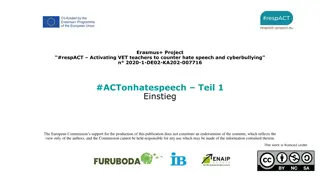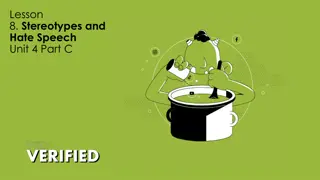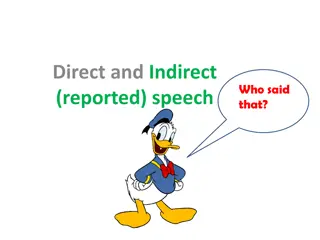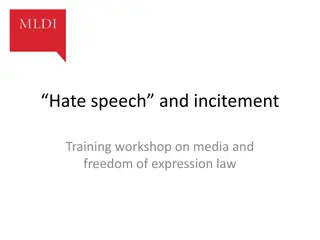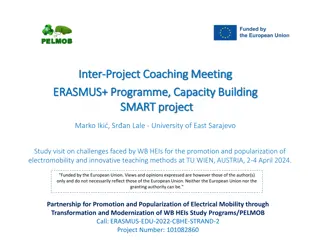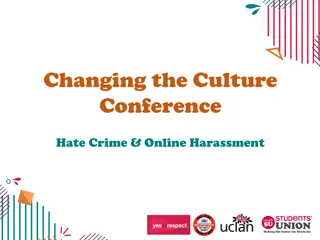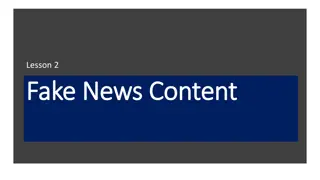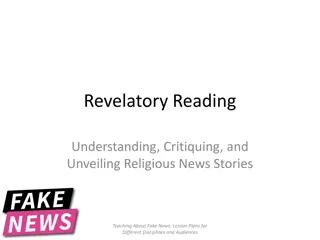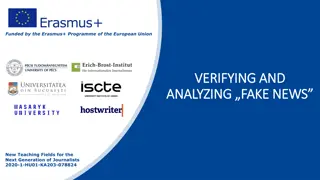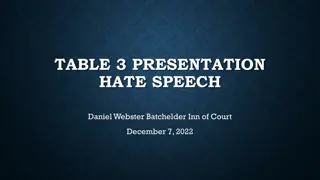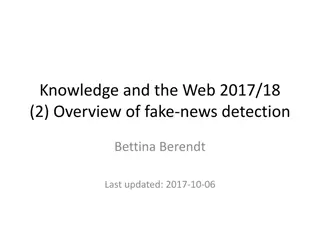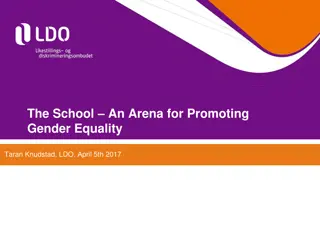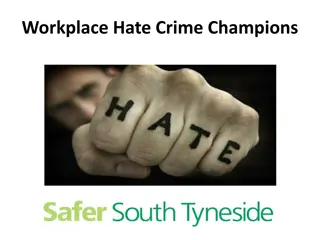Hate Speech and Fake News in the Balkans
This study delves into the prevalence of hate speech and fake news in the Balkans, shedding light on the harmful impact of such communication. It discusses the lack of an international legal definition for hate speech and explores how fake news spreads through fabricated stories, often disseminated via social media. The case of the Rwandan genocide exemplifies how hate speech can fuel violence and discrimination. By examining these issues, the research underscores the importance of combatting hate speech and fake news to promote dialogue and tolerance in the Balkan region.
Download Presentation

Please find below an Image/Link to download the presentation.
The content on the website is provided AS IS for your information and personal use only. It may not be sold, licensed, or shared on other websites without obtaining consent from the author.If you encounter any issues during the download, it is possible that the publisher has removed the file from their server.
You are allowed to download the files provided on this website for personal or commercial use, subject to the condition that they are used lawfully. All files are the property of their respective owners.
The content on the website is provided AS IS for your information and personal use only. It may not be sold, licensed, or shared on other websites without obtaining consent from the author.
E N D
Presentation Transcript
Hate Speech, Fake News in the Balkans A first approach Vlasis Vlasidis University of Macedonia
Vlasidis, Hate Speech, Fake News in the Balkans, A first approach Hate speech "public speech that expresses hate or encourages violence towards a person or group based on something such as race, religion, sex, or sexual orientation Cambridge Dictionary Hate speech include communications of animosity or disparagement of an individual or a group on account of a group characteristic such as race, colour, national origin, sex, disability, religion, or sexual orientation"
Vlasidis, Hate Speech, Fake News in the Balkans, A first approach there is no international legal definition of hate speech, and the characterization of what is hateful is controversial and disputed the term hate speech is understood as any kind of communication in speech, writing or behavior, that attacks or uses pejorative or discriminatory language with reference to a person or a group on the basis of who they are, in other words, based on their religion, ethnicity, nationality, race, color, descent, gender or other identity factor. This is often rooted in, and generates intolerance and hatred and, in certain contexts, can be demeaning and divisive. United Nations Strategy and Plan of Action on Hate Speech
Vlasidis, Hate Speech, Fake News in the Balkans, A first approach In 1993, in Rwanda, Hutu Power [political group] founded a new radio station, Radio T l vision Libre des Mille Collines (RTLM) for the young adults As the start of the genocide approached, the RTLM broadcasts focused on their anti-Tutsi propaganda. They characterized the Tutsi as a dangerous enemy that wanted to seize the political power at the expense of Hutu. They labeled the Tutsi as inyenzi, meaning non-human pests or cockroaches, which must be exterminated
Vlasidis, Hate Speech, Fake News in the Balkans, A first approach What is fake news and how can you identify it? we are defining fake news as those news stories that are false: the story itself is fabricated, with no verifiable facts, sources or quotes. Sometimes these stories may be propaganda that is intentionally designed to mislead the reader, or may be designed as clickbait written for economic incentives (the writer profits on the number of people who click on the story). In recent years, fake news stories have proliferated via social media, in part because they are so easily and quickly shared online.
Vlasidis, Hate Speech, Fake News in the Balkans, A first approach
Vlasidis, Hate Speech, Fake News in the Balkans, A first approach "Fake news" exists within a larger ecosystem of mis- and disinformation. Misinformation is false or inaccurate information that is mistakenly or inadvertently created or spread; the intent is not to deceive. Disinformation is false information that is deliberately created and spread "in order to influence public opinion or obscure the truth"
Vlasidis, Hate Speech, Fake News in the Balkans, A first approach Misinformation and disinformation is directly related to who the author(s) is and the different reasons why it is created. Someone wanting to make money, (teenagers in Veles, North Macedonia ) Satirists who want to either make a point or entertain you, or both Poor or untrained journalists Partisans who want to influence political beliefs and policy makers
Vlasidis, Hate Speech, Fake News in the Balkans, A first approach In the recent past, hate speech and fake news were on the service of the nationalist political groups. During the Yugoslav Wars (1991 2001), propaganda was widely used in the media of the Federal Republic of Yugoslavia, in Croatia and to an extent in Bosnian media and all of them use in extensis the hate speech and spread fake news. All sides used propaganda as a tool. Media in the former Yugoslavia was divided along ethnic lines and there were few independent voices who countered nationalist rhetoric.
Vlasidis, Hate Speech, Fake News in the Balkans, A first approach In Serbia media were under total control of Slobodan Milosevic In Croatia media were under total control of Franjo Tudjman and his party (HDZ)
Vlasidis, Hate Speech, Fake News in the Balkans, A first approach For the Serbian media, - Croats (collapsed into Ustashe) and Muslims (collapsed into Poturice). Words as "genocidal", "fascisoid", "heir of Usta e leader Ante Paveli , "neo-Usta e Croatian viceroy" to describe Croatian president Franjo Tudjman. HATE SPEECH Several propaganda cases provided by media in Serbia Pakrac genocide (Vecenje Novosti) Vukovar baby massacre (RTS) Dubrovnik burning tyres (RTS) Bosnian Mujahideen (Radio Prijedor) Prijedor massacre doctors (Radio Prijedor) FAKE NEWS
Vlasidis, Hate Speech, Fake News in the Balkans, A first approach Croatian media began to refer to Serbs as "bearded Chetnik hordes", "terrorists and conspirators" and a "people ill inclined to democracy". Milo evi , the President of Serbia, a "Stalinist and Bolshevik", "Stalin's bastard", a "bank robber" and an "authoritarian populist". HATE SPEECH Several propaganda cases provided by media in Croatia Zenica case (Vjesnik) Blaskic case (Kiseljak radio station) Mostar, Gorni Vakuf, (Radio Uskoplje) FAKE NEWS
Vlasidis, Hate Speech, Fake News in the Balkans, A first approach
Vlasidis, Hate Speech, Fake News in the Balkans, A first approach In Bosnia news items, especially in local TV stations, full of hate speech, war videos reuploaded to YouTube that depicted the usage of ethnic slurs towards both Serbs and Croats, calling them " etnici" and "Usta i" alike. HATE SPEECH
Vlasidis, Hate Speech, Fake News in the Balkans, A first approach In Kosovo war and after the end of the NATO peace operation or invasion. In 2004 March 16th, the main Albanian-language TV broadcasters began airing news of the fatal drowning of the three Kosovar Albanian children in the river Iber. It must be noted that at this stage it was absolutely unclear what had happened or even if all the missing children were dead, since not all the bodies had been recovered. RTV 21 (an independent private broadcaster, founded after the war): "Two Serbs chased four Albanian children today around 16:00 in the village of Caber and, while trying to escape from them, the Albanian children jumped into the Iber river. To learn more details we have our correspondent in Mitrovica FAKE NEWS
Vlasidis, Hate Speech, Fake News in the Balkans, A first approach Essential approach by the Serbs
Vlasidis, Hate Speech, Fake News in the Balkans, A first approach Rise in incidents of hate speech in Western Balkan countries Prospects of EU membership and poor economic conditions are causing increased social tension. This development fits with the European-wide trend. Far-right populist parties are jeopardizing liberal democracies in other EU countries such as France, Hungary, Poland and the Netherlands. Nationalism is on the rise, and slogans about the "decadent West" are making the rounds.
Vlasidis, Hate Speech, Fake News in the Balkans, A first approach In Croatia Hate speech against Serbs, Roma, Jews, immigrants, homosexuals, Women, colored people (Jammie Fox was subjected to racial slurs by two men while dinning at a restaurant at Dubrovnik) Soccer teams, players, bosses Not something new. Such speech was only used in private. Now such speech in the public arena.
Vlasidis, Hate Speech, Fake News in the Balkans, A first approach Joint programme "Horizontal Facility for the Western Balkans and Turkey 2019-2022", building on the earlier Actions in the field of minority protection and promotion of rights of LGBTI persons, includes a new component related to promotion of diversity and equality covering the entire Western Balkan region. The projects are set to place at the disposal of the region the expertise and/or recommendations from Council of Europe s European Commission against Racism and Intolerance, those stemming from the Framework Convention for the Protection of National Minorities and in the field of Sexual Orientation and Gender Identity
Vlasidis, Hate Speech, Fake News in the Balkans, A first approach Spread of Covid-19 has created waves of fear, uncertainty, and anxiety across the globe increase in hate speech. anti-foreigner sentiment has surged online and in the streets. Anti- Semitic conspiracy theories have spread and Covid-19 related anti- Muslim attacks have occurred. acknowledge that racism is being spread on social media platforms, in media reports and via the statements of politicians. Many have used this pandemic as an opportunity to further entrench repressive measures and take advantage of their powers to catalyse hate speech. Governments have failed to UN Secretary-General, Antonio Guterres
Vlasidis, Hate Speech, Fake News in the Balkans, A first approach In Moldova Hate speech and irresponsible language by politicians, clerics and journalists has worsened in Moldova as a result of the COVID-19 outbreak In Romania Hungarians living in Romania are responsible for the pandemic that brought the Romanian healthcare system and economy to its knees because the Democratic Alliance of Hungarians in Romania (also known as RMDSZ) backs the Social Democratic Party (PSD) Until we are able to gas them like the Nazis, the Roma will infect the nation: Viva Antonescu
Vlasidis, Hate Speech, Fake News in the Balkans, A first approach In Bulgaria Roma neighbours called hotbeds of infection Actions of the far-right party VMRO-BND Pm Boyko Borisov : Closure of entire Roma neighborhoods, churches should remain open for worshippers two UN human rights experts called on the Government of Bulgaria to stop hate speech and racial discrimination against the Roma minority in its response to COVID-19, and halt police operations targeting Roma neighbourhoods during the pandemic
Vlasidis, Hate Speech, Fake News in the Balkans, A first approach In North Macedonia Veles became the center of a global "fake news" scandal in 2016 after thousands of dubious stories were shared by more than 100 pro- Trump websites based in the town. International media organizations reported that the fake-news industry in Veles was run by tech-savvy teenagers. 2018 report by the Organized Crime and Corruption Reporting Project (OCCRP) Fake news project launched by a well-known Macedonian media attorney, Trajche Arsov and not by teenagers
Vlasidis, Hate Speech, Fake News in the Balkans, A first approach Clickbait operators in Veles are still running a number of websites that target conservative Americans We have no reason to suspect that the operators of these sites are motivated by anything other than financial gain. However, they continue to profit from, and possibly contribute to, polarization in America, with right-leaning individuals unwittingly consuming foreign-amplified content. Stanford Internet Observatory
Vlasidis, Hate Speech, Fake News in the Balkans, A first approach Pandemic in the Balkans Authoritarian drift in some countries, especially Serbia Anti western actors posing their own agenda Media under strict control of the governments, especially Serbia Lack of information. Misleading health information, consumer fraud, cybercrime and targeted disinformation campaigns have posed several potential risks to the citizens, their health and their trust in health authorities
Vlasidis, Hate Speech, Fake News in the Balkans, A first approach The need for Fact checkers and Watchdogs Four Western Balkans organisations contribute with Facebook s Fact-Checking Programme Raskrinkavanje.ba Bosnia and Herzegovina Raskrinkavanje.me (Centre for Democratic Transition) Montenegro Metamorphosis Macedonia Foundation and Truthmeter North Istinomer accountability) Serbia (Centre for research transparency and
Vlasidis, Hate Speech, Fake News in the Balkans, A first approach Why it is so important to have watchdogs and fact checkers? Mainstream media reproduce or republish false stories. Even if fact checkers do exist and they are doing their job very well, aren t they in danger? The case of Metamorphosis Foundation and the www.lider.com.mk These are the people who delete content from Facebook in Macedonia!
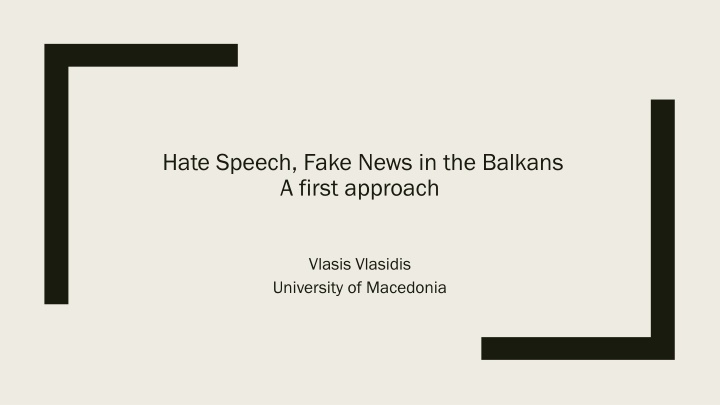


![Prevention and Combating of Hate Crimes and Hate Speech Bill [B.9B.2018]](/thumb/60513/prevention-and-combating-of-hate-crimes-and-hate-speech-bill-b-9b-2018.jpg)
